人教版book5unit2Reading
- 格式:ppt
- 大小:27.62 MB
- 文档页数:58
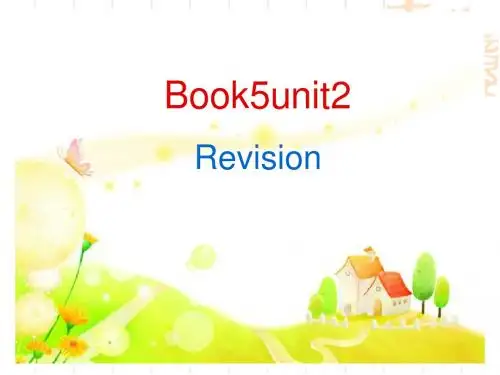

Period 5 GrammarThe General Idea of This PeriodThis period lays emphasis on grammar, that is, the past participle used as the object complement, which is also one of the difficult points in Senior English grammar.First, revise what the students have learnt in the last period by checking their homework , including some important phrases and translating some sentences from Chinese into English.In this unit the students should learn about the past particip le used as the object complement. First, the teacher presents one sentence containing a past participle used the object complement, which was taken from the reading passage.Teacher tries to analyze the function of the past participle and help the students have a general idea about it.Then the students are asked to find all the sentences that contain a past participle used as the object complement in the Reading passage.Then the students can come to a conclusion of the basic structure of the past participle1used as the object complement, that is, have/get/find/...+object +past participle.Next the teacher will explain the differences between the present participle and the past participle.The teacher compares them when are used as the attributive, predicate, object complement and adverbial.In order to do so, the teacher always shows some typical examples.After that, the students will find out the difference between them.Then they are provided with some exercises for them to consolidate what they have learned.In order to consolidate the grammar points, the students will do some oral practice.In this practice, the students will ask and answer some questions in pairs, using the past participle as the object complement.The students should not only learn about the grammar, but also learn how to use them, which is much more important.Also this part can help the students to communicate with each other using the language that they have learned, and this is the real purpose of learning the target languages.Teaching Important Point2Learn grammar: the past participle used as the object complement.Teaching DifficultiesKnow the differences between the present participle and the past participle when they are used as the attributive, predicate, object complement and adverbial.Learn to make a choice between the present participle and the past participle according to the different context.Teaching Aidsa tape recordera projectorthe blackboardThree Dimensional Teaching AimsKnowledge AimsLearn the past participle used as the object complement.3Know the differences between the present participle and the past participle when they are used as the attributive, predicate, object complement and adverbial.Ability AimsLearn to make a choice between the present participle and the past participle according to the different context.Learn to communicate with each other by using the language that they have learne d.Emotional AimsLearn to cooperate with each other.Teaching ProcedureStep 1 GreetingsTeacher greets the students as usual.Step 2 RevisionT: At the beginning of this period, let’s check your homework.First, please write down the4phrases according to the Chinese explanations.S: 1) 与……连结 be linked to2) 令某人惊讶的是 to one’s surprise3) 到处寻找, 观光 look around4) 睁大眼睛 keep one’s eyes open5) 在特殊的场合 on special occasions6) 为了纪念…… in memory of7) 拍一张照片 have a photo taken8) 展出 on show9) 为……感到骄傲 be proud of10) 遗留, 漏掉 leave outT: Good.Now, let’s check your translations of the five sentences.S1: When David Beckham arrived in Japan, the thrilled fans all went to meet him.5S2: In order to celebrate my cousin’s wedding, my aunt and uncle had an evening party arranged.S3: It is probably puzzling, but to set an example can help to clarify the puzzle.S3: Don’t be influenced by her words.You must decide for yourself.S4: Polar took the place of her father to treat the guests at the party, since her father was not available to.Step 3 Discovering Useful StructuresT: In the last unit we learnt about the past participle used as the attributive.Now let’s look at the following sentence taken from the passage.Please tell me what function is the past participle.Now when people refer to England you find Wales included as well.S: It is used as the object complement.T: You are right.So in this unit we will learn about the past participle used as the object complement.The structure is often formed with have /get /find/...+object +past participle.Please6find three more sentences from the reading passage with past participles used as the object complement.(After several minutes.)S1: To their surprise, the three countries found themselves united peacefully instead of by war.(Para.3)S 2: However, just as they were going to get Ireland connected to form the United Kingdom, the southern part of that country broke away to form its own government.(Para.3) S3: You find most of the population settled in the South, but most of the large industrial cities in the Midlands ad North of England.(Para.5)T: Yes, you are very clever.Now, look at Part 2 (Discovering useful structures) on Pages plete the sentences by using the words in brackets and the structure have /get /find something done.T: Let’s do No.1 as an example.We are having the house mended now.7(After several minutes.)S1: No.2 You look different today.Have you had your hair cut?S2: No.3 Do you want to get the dictionary delivered to your house or would you prefer to come to the shop for it?S3: No.4 Sorry, I haven’t had the film developed yet.S4: No.5 On my way to the station my car broke down.When I got to the repair shop I found it closed.S5: No.6 The computer doesn’t seem to work well.You’d better get it repaired.S6: No.7 Jill and Eric had all their money stolen while they were on holiday.S7: No.8 Chris had some flowers sent to Sarah on her birthday.Then Chris asked Sarah to marry hem and they had it announced in the newspaper.They had no time to arrange their own wedding, so they had it organized by a company.T: Ex cellent.Past participle used as the object complement can also be put after such words8as see, hear, notice, watch, keep, make, feel, etc.Please put the following sentences into English.1.她高兴地看到孩子们在托儿所受到很好的照顾。
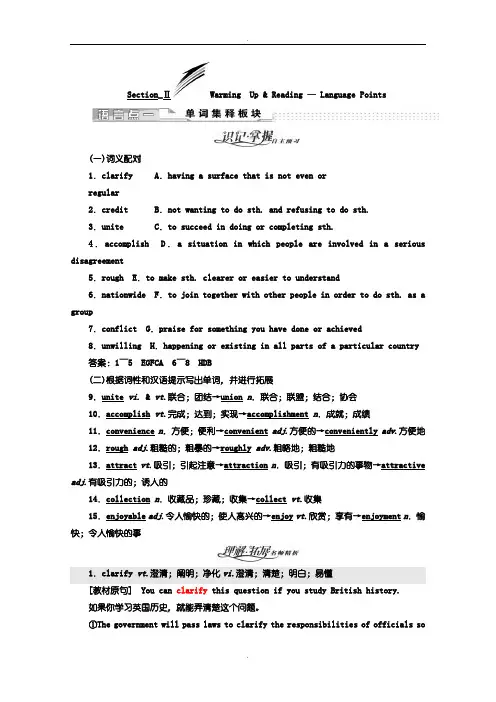
Section_ⅡWarming Up & Reading — Language Points(一)词义配对1.clarify A.having a surface that is not even orregular2.credit B.not wanting to do sth. and refusing to do sth.3.unite C.to succeed in doing or completing sth.4.accomplish D.a situation in which people are involved in a serious disagreement5.rough E.to make sth. clearer or easier to understand6.nationwide F.to join together with other people in order to do sth. as a group7.conflict G.praise for something you have done or achieved8.unwilling H.happening or existing in all parts of a particular country 答案:1~5 EGFCA 6~8 HDB(二)根据词性和汉语提示写出单词,并进行拓展9.unite vi. & vt.联合;团结→union n.联合;联盟;结合;协会10.accomplish vt.完成;达到;实现→accomplishment n.成就;成绩11.convenience n.方便;便利→convenient adj.方便的→conveniently adv.方便地12.rough adj.粗糙的;粗暴的→roughly adv.粗略地;粗糙地13.attract vt.吸引;引起注意→attraction n.吸引;有吸引力的事物→attractive adj.有吸引力的;诱人的14.collection n.收藏品;珍藏;收集→collect vt.收集15.enjoyable adj.令人愉快的;使人高兴的→enjoy vt.欣赏;享有→enjoyment n.愉快;令人愉快的事1.clarify vt.澄清;阐明;净化vi.澄清;清楚;明白;易懂[教材原句] You can clarify this question if you study British history.如果你学习英国历史,就能弄清楚这个问题。
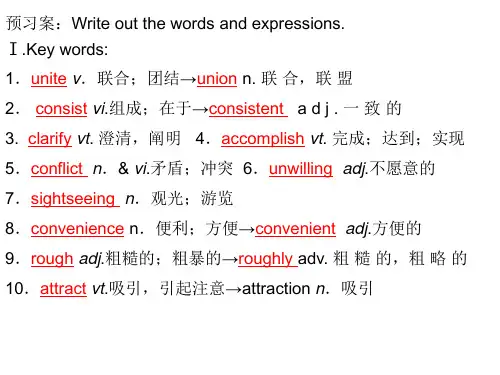
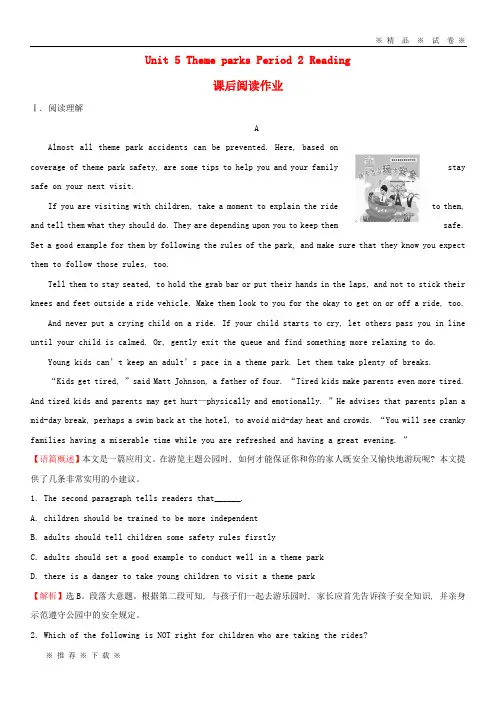
Unit 5 Theme parks Period 2 Reading课后阅读作业Ⅰ. 阅读理解AAlmost all theme park accidents can be prevented. Here, based oncoverage of theme park safety, are some tips to help you and your family stay safe on your next visit.If you are visiting with children, take a moment to explain the ride to them, and tell them what they should do. They are depending upon you to keep them safe. Set a good example for them by following the rules of the park, and make sure that they know you expect them to follow those rules, too.Tell them to stay seated, to hold the grab bar or put their hands in the laps, and not to stick their knees and feet outside a ride vehicle. Make them look to you for the okay to get on or off a ride, too.And never put a crying child on a ride. If your child starts to cry, let others pass you in line until your child is calmed. Or, gently exit the queue and find something more relaxing to do.Young kids can’t keep an adult’s pace in a theme park. Let them take plenty of breaks.“Kids get tired,”said Matt Johnson, a father of four. “Tired kids make parents even more tired. And tired kids and parents may get hurt—physically and emotionally. ”He advises that parents plan a mid-day break, perhaps a swim back at the hotel, to avoid mid-day heat and crowds. “You will see cranky families having a miserable time while you are refreshed and having a great evening. ”【语篇概述】本文是一篇应用文。
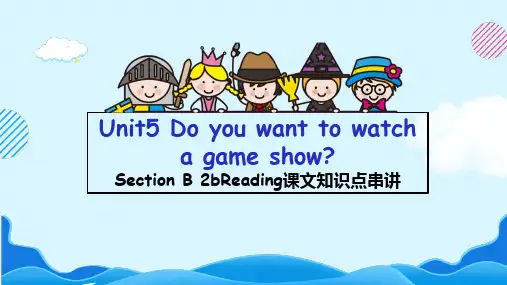
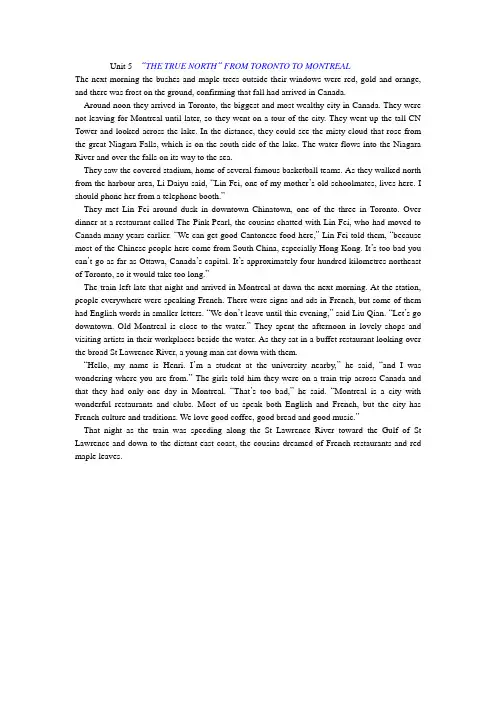
Unit 5 “THE TRUE NORTH” FROM TORONTO TO MONTREALThe next morning the bushes and maple trees outside their windows were red, gold and orange, and there was frost on the ground, confirming that fall had arrived in Canada.Around noon they arrived in Toronto, the biggest and most wealthy city in Canada. They were not leaving for Montreal until later, so they went on a tour of the city. They went up the tall CN Tower and looked across the lake. In the distance, they could see the misty cloud that rose from the great Niagara Falls, which is on the south side of the lake. The water flows into the Niagara River and over the falls on its way to the sea.They saw the covered stadium, home of several famous basketball teams. As they walked north from the harbour area, Li Daiyu said, “Lin Fei, one of my mother’s old schoolmates, lives here. I should phone her from a telephone booth.”They met Lin Fei around dusk in downtown Chinatown, one of the three in Toronto. Over dinner at a restaurant called The Pink Pearl, the cousins chatted with Lin Fei, who had moved to Canada many years earlier. “We can get good Cantonese food here,” Lin Fei told them, “because most of the Chinese people here come from South China, especially Hong Kong. It’s too bad you can’t go as far as Ottawa, Canada’s capital. It’s approximately four hundred kilometres northeast of Toronto, so it would take too long.”The train left late that night and arrived in Montreal at dawn the next morning. At the station, people everywhere were speaking French. There were signs and ads in French, but some of them had English words in smaller letters. “We don’t leave until this evening,” said Liu Qian. “Let’s go downtown. Old Montreal is close to the water.”They spent the afternoon in lovely shops and visiting artists in their workplaces beside the water. As they sat in a buffet restaurant looking over the broad St Lawrence River, a young man sat down with them.“Hello, my name is Henri. I’m a student at the university nearby,”he said, “and I was wondering where you are from.” The girls told him they were on a train trip across Canada and that they had only one day in Montreal. “That’s too bad,”he said. “Montreal is a city with wonderful restaurants and clubs. Most of us speak both English and French, but the city has French culture and traditions. We love good coffee, good bread and good music.”That night as the train was speeding along the St Lawrence River toward the Gulf of St Lawrence and down to the distant east coast, the cousins dreamed of French restaurants and red maple leaves.。
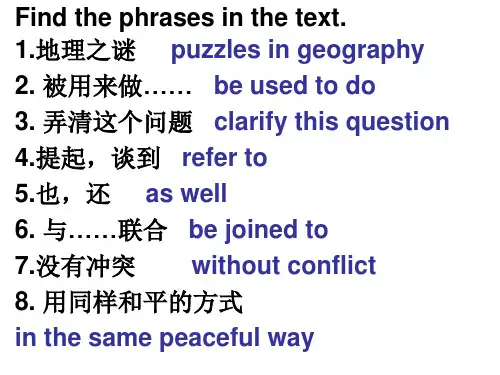
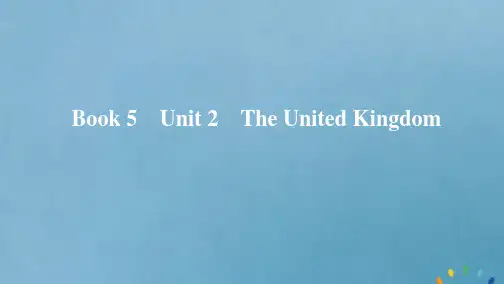
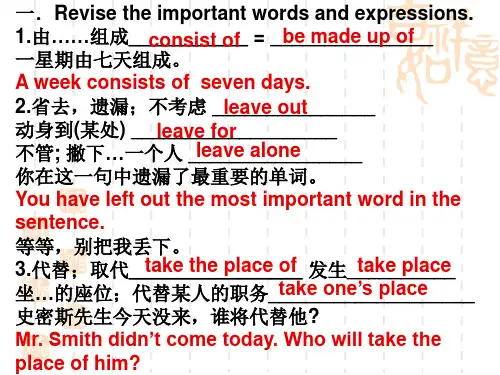
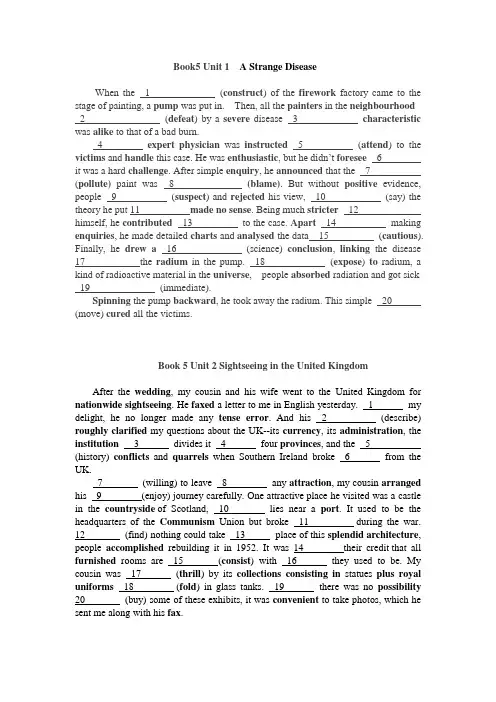
After the wedding, my cousin and his wife went to the United Kingdom for nationwide sightseeing. He faxed a letter to me in English yesterday. 1 my delight, he no longer made any tense error. And his 2 (describe) roughly clarified my questions about the UK--its currency, its administration, the institution 3 divides it 4 four provinces, and the 5 (history) conflicts and quarrels when Southern Ireland broke 6 from the UK.7 (willing) to leave 8 any attraction, my cousin arranged his 9 (enjoy) journey carefully. One attractive place he visited was a castle in the countryside of Scotland, 10 lies near a port. It used to be the headquarters of the Communism Union but broke 11 during the war.12 (find) nothing could take 13 place of this splendid architecture, people accomplished rebuilding it in 1952. It was 14 their credit that all furnished rooms are 15 (consist) with 16 they used to be. My cousin was 17 (thrill) by its collections consisting in statues plus royal uniforms 18 (fold) in glass tanks. 19 there was no possibility 20 (buy) some of these exhibits, it was convenient to take photos, which he sent me along with his fax.Book 5 Unit 3 An Air CrashI was a previous typist in a post office. Because I couldn’t tolerate1 (type) any more postage bills or postcodes on a typewriter every day,I resigned. With a greedy 2 (motivate) of making big money, I took3 working as a business4 (represent) for the G.E Ecology Company, which produced goods by5 (recycle) useful materials from our dustbins. My new job left me good impressions6 many aspects except7 the working timetable was full of traveling by jets.Once, when speeding up, our jet 8 (swallow) by a thunderstorm, 9 destroyed our GPS receiver and made us lose sight 10 the directions. A constantly flashing light 11 (show) that our jet was in danger. A steward instantly asked us 12 (put) on masks and fasten the 13 (safe) belts, and then pressed a button to switch on the escaping capsule. It slid sideways out of the opening at once and landed in a desert area 14 (safe). 15 (lack) food and tablets, we were nervous and 16 (certain) at first. But we all kept optimistic and made good adjustment17 the situation.We swept 18 the surrounding mud to make our settlement and were back 19 our feet soon. Finally, 20 (guide) by the smoke of our crashing jet, some local citizens came by carriages and saved us.6(treat) according to his complex symptoms. She 7 (mild) squeezed the poisonous liquid out of his throat and put bandages firmly 8place to apply pressure9 the ankle wound to stop 10 (bleed). As for the burn, she used scissors 11 (remove) his sleeve, 12 (pour) a basin of cold water over the burn to cool 13and put her hands on a damp blouse to cover his 14 (swell) tissue tightly. She also inspired his 15 (brave) to fight against the 16 (bear) pain. Her first aid made a vital17 (different) in saving his life. 18 ceremony was held to honour the nurse 19 overcame a 20 (vary) of barriers to save the boy.。
Section ⅡWarming Up & Reading — Language Points一、这样记单词记得准·写得对记得快·记得多Ⅰ.基础词汇1.temporary adj.临时的;临时的2.choke v i.&v t. (使)噎住;(使)窒息an n. 器官4.barrier n. 屏障;障碍(物)plex adj. 简单的6.liquid n. 液体7.scissors n.(pl.) 剪刀8.squeeze v t.&v i. 榨;挤;压榨9.vital adj. 至关重要的;生死攸关的10.symptom n. 症状;征兆11.pour v t.&v i. 倒;灌;注;涌12.damp adj. 潮湿的1.temporary adj.临时的;临时的[反义]permanent adj.永久的[联想]contemporary adj.当代的;同时代的an n.器官[联想]器官及身体部位相关词汇合锦①lung n.肺②liver n.肝③skin n.皮;皮肤④ankle n.踝(关节)⑤wrist n.手腕⑥tissue n.(生物)组织3.liquid n.液体[联想]物质的各种存在形式①solid n.固体adj.牢固的;固体的②steam n.蒸汽;水蒸气③gas n.煤气;气体4.scissors n.(pl.)剪刀[规律]一些成双成对的名词通常只有复数形式,常见的还有:①jeans牛仔裤②headphones耳机③trousers裤子④glasses眼镜⑤shoes鞋子⑥compasses圆规Ⅱ.拓展词汇1.bleed v i.&v t.流血→blood n.血;血液2.injury n.损伤;损害→injure v t.使受伤;弄伤→injured adj.受伤的3.poison n.毒药;毒害v t.毒害;使中毒→poisonous adj.有毒的d adj.稍微的;温存的;温存的→mildly ad v.稍微地;温存地5.swell v i.&v t.(使)膨胀;隆起→swollen adj.肿胀的6.unbearable adj.难以忍受的;不能容忍的→bearable adj.可忍受的;能应付的→bear v.忍受7.variety n.变化;多样(化);多变(性)→vary v i.变化;变动→various adj.各种各样的5.vital adj.至关重要的;生死攸关的[同义]important; of great importance6.aid n.&v t.挂念;救济;资助[联想]“挂念”家族①help n.&v t.挂念②assist v t.挂念;帮忙③support n.&v t.支持;挂念④sponsor v t.赞助⑤fund v t.资助⑥do sb. a favour挂念某人⑦give/lend sb. a hand挂念某人7.与“急救”有关的词汇①poison n.&v t.毒药;使中毒②injury n.损伤;损害③choke v i.&v t.(使)噎住;(使)窒息④bleed v i.&v t.流血⑤treat v t.&v i.治疗⑥cure v t.治愈⑦apply v t.涂;敷⑧first aid急救二、这样记短语记坚固定短语多积常用词块1.first_aid(对伤患者的)急救2.fall_ill 生病3.get_injured 受伤4.a_variety_of 各种各样的5.electric_shock 触电;电休克6.squeeze_out 榨出;挤出7.over_and_over_again 反复;多次8.in_place 在适当的位置;适当1.an essential part必不行少的部分2.a barrier against ... 抵挡……的一道屏障3.a sense of touch 触觉4.within a day or two 一两天内5.tissue and organs under the skin皮下组织和器官6.take off 脱掉7.icy water 冰水8.get infected 感染三、这样记句式先背熟再悟通后仿用1.... it is where you feel cold, heat or pain and it gives you your sense of touch.……正是皮肤使你感到冷、热或苦痛,它还使你有触觉。